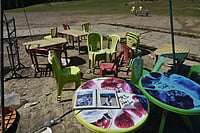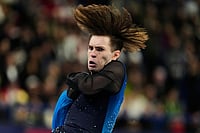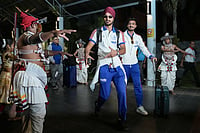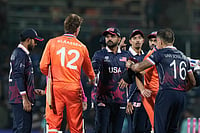The birth centenary of the legendary Bengali poet Nirendranath Chakraborty will begin on 19 October this year. He was a poet who had the courage to stand tall in front of any king and tell him, you are naked. In fact, his 'Ulanga Raja' (The Naked King) is perhaps one of the most-read poems in Bengali households. As a poet, his popularity in Bengal could only be compared with that of Tagore. His death in 2018 witnessed an unprecedented emotional outburst of the Bengali poetry-lovers. In almost every town of West Bengal, at least one condolence meeting was held after his demise.
Nirendranath Chakraborty was born on 19 October 1924 in the Faridpur district of undivided India. He graduated from Calcutta University and began his career as a journalist. Though Chakraborty wrote fiction, memoirs and essays, he is chiefly recognized as a poet. Poetry won two important prizes for him: the Sahitya Akademi Award and Ananda Puroskar. He was also given the fellowship of Sahitya Academy, the highest honour that the Academy confers upon an Indian author.
The book that won the Sahitya Academy Award for Chakraborty was 'The Naked King'. The titular poem of the book, as mentioned already, has attained a mythic stature in Bengal. Lines from the poem are often quoted by media, parties in opposition, radical thinkers, activists and individual iconoclasts alike, to criticize the shameless display of power, corruption and nepotism by the party in power. In fact, Nirendranath Chakraborty himself was an iconoclast and he, all through his life, gave voice to the oppressed. He went on questioning whatever he considered illogical and oppressive. In the poem, “Coupled Death,” he writes, “Rather disagree, have faith in other knowledge./Rather get hurt by the stones of questions./Rather sharpen the nail of your intelligence, protest./Whatever you do, at least, don’t easily give consent/to whatever is said” (my translation). He, actually, never wanted to be a member of the Navaratna of the king or the queen. In the poem, “A Little Away from the Court,” he made his stance quite clear: “I indeed know what earns claps./But I’ll never be greedy for claps./I know you’re surrounded by many slaves./The moment you indicate,/they start singing in bizarre joy, ringing the bell of their watches!/I also know one or two songs./But I’ll never become a part of the chorus./I”ll sing you exactly the way I know you” (my translation). He indeed could call a spade a spade. His language was simple and straight; the tone of his poems usually has a sense of urgency that immediately strikes the readers.
For Chakraborty, resistance, however, had multiple shades and meanings. It was not always about crying aloud; it was also about throwing light on the wounds of society and the system. He was the poet who had the courage to utter that something is rotten in the state of Denmark. He knew that one of the modes of resistance is to expose the system that oppresses the masses. As a poet, he could also identify the anger of the middle class and its repression due to societal and state surveillance. Some of his poems subtly bring to the fore this suppressed anger of the middle class. There are, again, some poems of Chakraborty in which he simply underlines different forms of discrimination and the sacrifices made by the have-nots. One such poem is “Bloodshed in Late Afternoon.” Using the image of a cricket match (to be more specific, the image of the night-watchman), Chakraborty equates the number eleven player of a cricket team with the subalterns of society. He writes, “You go./You go and quench their thirst./You are my number eleven player./But I promote you to number three./Not for your sake/But for the interest of the team./My child, you can assume that/in this late afternoon/we are sending you to get killed /for the interest of the team” (my translation).
Chakraborty’s protest was not limited to the Bengali socio-political milieu only. Pan-Indian events and circumstances often disturbed him. He indeed has reacted to some of the historic moments of post-independence India in his own unique ways. Immediately after the Emergency, he wrote a poem titled, “Black Ambassador”:
When the black ambassador entered the conversation,
the man promptly turned to
talking about murder, riot, plunder etc.
Then, like the head that follows when the ear is dragged,
came state policy, emergency, law and order.
With profound passion the gentleman said,
“We need food cloth shelter cure. we absolutely.
Who does not need such fine things? Do I not?
Of course I do. A hundred times over.
But before all of them, we need law and order.
That is most essential.”
For whom, I ask. But get no answer.
(Translation by Sayandeb Chowdhury)
The tone of this poem is not at all loud. It just gently reveals how the state prioritizes the domination of its citizens over fulfilling their basic needs and demands. With measured sarcasm, Nirendranath Chakraborty here also exposes the ideological emptiness of those who supported the use of the repressive state apparatus by the state in the name of maintaining law and order during the Emergency.
One of the famous poems of Nirendranath Chakraborty is on Babri Masjid. It is titled, “True, Seleucus”:
A temple or a mosque or a controversial structure–
From amidst this tumultuous debate
come out two terribly thin men
wearing loincloths
beating brass dishes.
…
They were amidst the crowd, and sometimes they did clap too, but
they didn’t know anything about
the issue on which those gentlemen
were debating.
(My translation)
This poem clearly shows how insignificant the Mandir/Masjid debate is to the common people of India and how those people who are a part of the mass hysteria about this debate do not know anything about it. In this context, it has to be pointed out that Nirendranath Chakraborty was neither a member nor a supporter of any political party. In fact, the title of one of his poems was “I Do Not Belong to Any Party.”
Nirendranath’s sarcasm reaches its peak in the poem “The Naked King.” The word ‘king’ in this poem symbolizes authority, chair, power. Literally it can also mean the head of the state. In this poem, not only does Nirendranath criticize the unashamed use of power by the persons in power and the malfunctioning of the state but also the surrender of the common people before power because of various reasons. He writes:
Everyone sees that the king is naked, and yet everyone claps.
Everyone cheers. Bravo, Bravo!
Some are victims of tradition, some of fear;
Some have pawned their brains to others.
Some are parasites, some are favour-seekers, some expectants, frauds;
Some think, royal robes are very fine, though can’t be seen, yet they exist,
at least, it is not impossible that they do.
(My translation)
As the poem proceeds, Nirendranath informs us that he is reproducing a well-known story in which there were not only a few cowards, tricksters, idiots and flatterers but also a truthful, innocent, courageous child who blatantly told the king that he was naked. The poem ends with the lamentation of the poet that the king of the fiction is now out on the open street and is again surrounded by the flatterers but the child is missing. Nirendranath pleads to the readers to find out the child and to bring him before the king so that raising his voice above the applause and the eulogy, he can ask, “King, where are your clothes?” The poem creates a binary between adulthood and childhood, experience and innocence, fear and courage, manipulation and forthrightness to argue that protest and calculation are mutually exclusive.
Needless to say the naked king is out again on the street. The flatterers are again cheering him up saying, “Bravo, Bravo!” But the child is missing and so is a poet like Nirendranath. He has left us in a time when probably we need him the most.

























